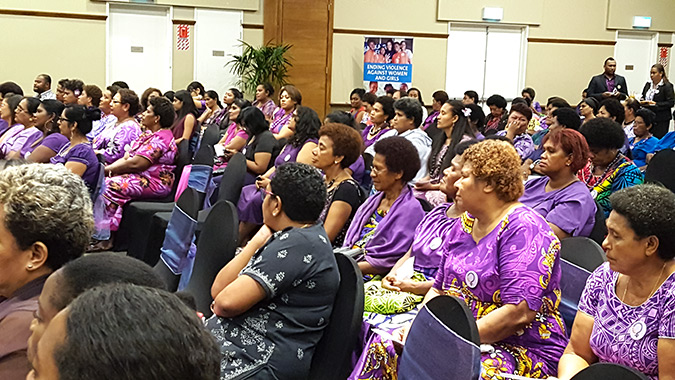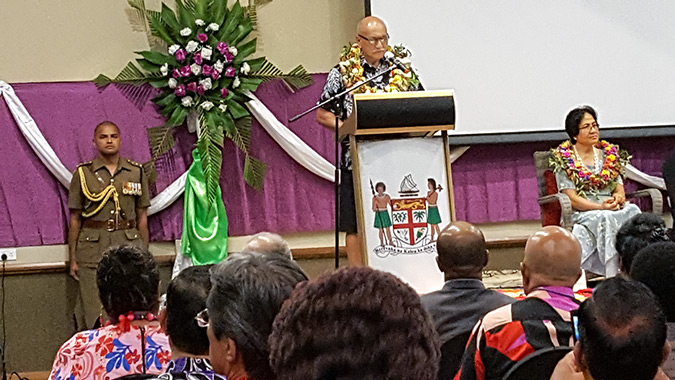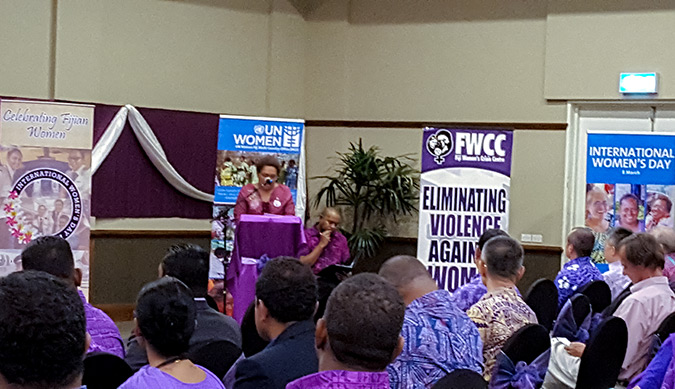Fiji Services for Survivors of Gender-based Violence Set to Further Improve
Date:
Fiji — Women and children in Fiji confronted by violence will have improved access to timely and relevant services with the launch of a new Service Delivery Protocol on International Women's Day.

At a gala event hosted by the Ministry for Women, Children and Poverty Alleviation (MWCPA), the President of Fiji Jioji Konousi Konrote, OF, MC, officially launched the Fiji National Service Delivery Protocol for Responding to Cases of Gender Based Violence; Standard Operating Procedures for Interagency Response Among Social Services, Police, Health and Legal/Justice Provider.

"The National Service Delivery Protocol is a commendable undertaking made possible through the extensive consultations across Government and the existing service providers," the President said.
"I offer my deepest congratulations to the Taskforce on the National Elimination of Violence against Women for the production of the National Service Delivery Protocol," the President said, adding that: "Without the technical support of the UN Women and their leadership role in coordination during consultations, the Service Delivery Protocol would have been difficult to achieve."
The Protocol provides a multi-sectorial response to ensure that appropriate, timely and quality services are provided to survivors of gender-based violence in Fiji.
It is a binding agreement for frontline service providers committing them to a common set of principles and guidelines to ensure GBV survivors - most commonly women and girls - receive the best care and treatment from all sectors in a response.
Furthermore, it also commits the Fiji Police Force, Judicial Department, Legal Aid Commissioner, Ministry of iTaukei Affairs, Ministry of Health and Medical Services and the MWCPA, along with NGO service providers to play their role in obtaining better outcomes and ongoing safety and security for survivors.
Development of the new Protocol has been led by the Fijian Government's Taskforce - a formal body to address issues of violence faced by women and children - in collaboration with health, police, counselling and advocacy, shelter, legal aid and other frontline service providers plus technical and funding support from the UN Women Fiji Multi-Country Office (MCO).

Speaking at a Press Conference following the launch, Abigail Erikson, UN Women Fiji Multi-Country Office (MCO) EVAWG Programme Manager, highlighted the importance of the Protocol and its survivor-centred approach.
"We know that how women and girl survivors are treated within the frontline care system has a great impact - positively or negatively - on their care and healing. This underscores how critical it is for service providers to be operating from the same set of guidelines and principles that promote survivor-centred care and treatment," Ms Erikson said.
"The Protocol commits frontline service providers to a common set of principles and guidelines to ensure GBV survivors, mostly women and girls, receive the best care and treatment from all sectors as part of a coordinated, united response.
"For example, this means ensuring all service providers are upholding core principles such as commitment to confidential care, ensuring safety at every stage of case response, and treating all survivors with the dignity and respect that they deserve," she said.
Coordinator of the Fiji Women's Crisis Centre, Shamima Ali, said "this is an historic milestone in the work on eliminating violence and helping women, girls and child abuse survivors to better access services."
"If we're all coordinated and working better together, then we can better deliver the right service at the right time when it's most needed by survivors of violence," Ms Ali said.
"The launch of this Protocol further binds our services together by clarifying good practices and exactly what each of our services offer, and how we can best work together to ensure survivors are treated with the dignity, respect and care they deserve.
UN Women's Abigail Erikson added that, "at a global level, UN Women plays a lead role in supporting national governments to improve the coordination and governance of service delivery."
"We do this through the development of global guidance that informs how national actors can best develop an interagency response system that ensures police and justice, counselling and social support, and health care responses are high quality, accessible and well-coordinated," Ms Erikson said.
"It is a privilege for UN Women to work alongside such the government of Fiji and the frontline service providers organisations who work tirelessly across Fiji to support women, children and families to heal and recover from gender-based violence. Developing this Protocol indicates how progressive and forward thinking these partners are on a global scale."
BACKGROUND INFORMATION:
Fiji National Service Delivery Protocol for Responding to Cases of Gender Based Violence - Standard Operating Procedures for Interagency Response Among Social Services, Police, Health and Legal/Justice Provider (called the 'Service Delivery Protocol').
In Fiji, evidence shows that gender-based violence is a serious issue yet there is a lack of clarity around the standard operating procedures for responding to survivors of gender-based violence. There are many services available, but more coordination is needed across agencies and sectors. Currently - as highlighted in the Service Delivery Protocol - reports of violence to police, health and social services remains low due to stigma, fear, shame, high levels of community tolerance of violence, inadequate response from police and legal services, and lack of access to services in some rural areas and smaller communities, with limited options or support to escape the violence. A well-coordinated response across agencies responding to individual cases will improve practice and encourage more women and girls to come forward.
Violence against Women and Girls (VAWG): Fiji has twice the global average
Violence against women and girls is recognized worldwide as a social, political, and public health problem as well as a fundamental violation of human rights, with 1 out of every 3 women experiencing physical or sexual violence in their lifetime. In Fiji, 64 per cent of Fijian women (almost 2 in 3) aged 18-49 who have ever been in an intimate relationship experienced physical and/or sexual violence or both by a husband or intimate partner in their lifetime - almost double the global average.
This statistic, coming from the national Violence Against Women (VAW) prevalence study conducted by the Fiji Women's Crisis Centre (FWCC), published in 2013,¹ highlights the serious and pervasive problem of gender-based violence (GBV). The main forms of violence reported by Fijian women over the course of a lifetime are physical, sexual and emotional abuse by an intimate partner; sexual assault; and sexual harassment. Physical violence is the most widespread over a woman's lifetime in Fiji, with 61 per cent of all ever-partnered women (more than 3 in 5) experiencing it, compared with 58% experiencing emotional violence and 34 per cent (more than 1 in 3) experiencing sexual violence (FWCC 2013).
Violence against women and girls is a grave violation of human rights.
Every woman and girl has the right to live her life without the threat of violence.
A survivor of gender-based violence has the right to report the violence to anyone she chooses, and anyone who is approached by a survivor of GBV for assistance should provide objective and comprehensive information to the survivor on services available in the community. In Fiji, the most common first point of referral for cases of gender-based violence is the police.
What is the purpose of the Service Delivery Protocol?
The primary purpose of the Interagency Service Delivery Protocol is to outline overall guidelines for standard operating procedures for interagency response to gender-based violence (GBV ). The Protocol ensures the provision of appropriate, timely and quality services for survivors of gender-based violence.
The Protocol is a binding agreement for frontline service providers committing them to a common set of principles and guidelines to ensure GBV survivors - most commonly women and girls - receive the best care and treatment from all sectors in a response. Furthermore, it also commits the Fiji Police, the Judiciary and the Office of Public Prosecutions, to play their role in obtaining better justice outcomes and ongoing safety and security for innocent survivors.
Development of the Service Delivery Protocol
In 2008 there was a cabinet decision resulting in the Ministry of Women, Children & Poverty Alleviation (MWCPA) being tasked with developing a service delivery protocol. UN Women and MWCPA began in earnest in 2015 to start developing a protocol. A series of national consultations were held with all divisions represented. By early last year, a first draft of the Protocol was ready. In May 2017, UN Women and the MWCPA invited all the partner government agencies and services providers to a national Validation Workshop, attended by more than 40 participants. At the event, the Assistant Minister for Women, Children and Poverty Alleviation, Hon Veena Bhatnagar, highlighted "the success of these protocols will depend on how well we consult during this drafting phase, and ensure service providers unite in a meaningful way to help determine the pathway to best help victims." Adding: "There are many services available for survivors of gender-based violence in Fiji and they need to have ways to best access the different services available."
Government partners:
- Ministry of Women, Children & Poverty Alleviation (MWCPA)
- Ministry of Health and Medical Services
- Fiji Police Force
- Judicial Department
- Legal Aid Commissioner
- Ministry of iTaukei Affairs
Service provider partners:
- Fiji Women's Crisis Centre
- Medical Services Pacific
- Empower Pacific
- Homes of Hope
- The Salvation Army
The first edition of the National Service Delivery Protocol is well coordinated, abides by a standard of care, and was officially launched in Suva, Fiji on 8 March 2018 on International Women's Day.